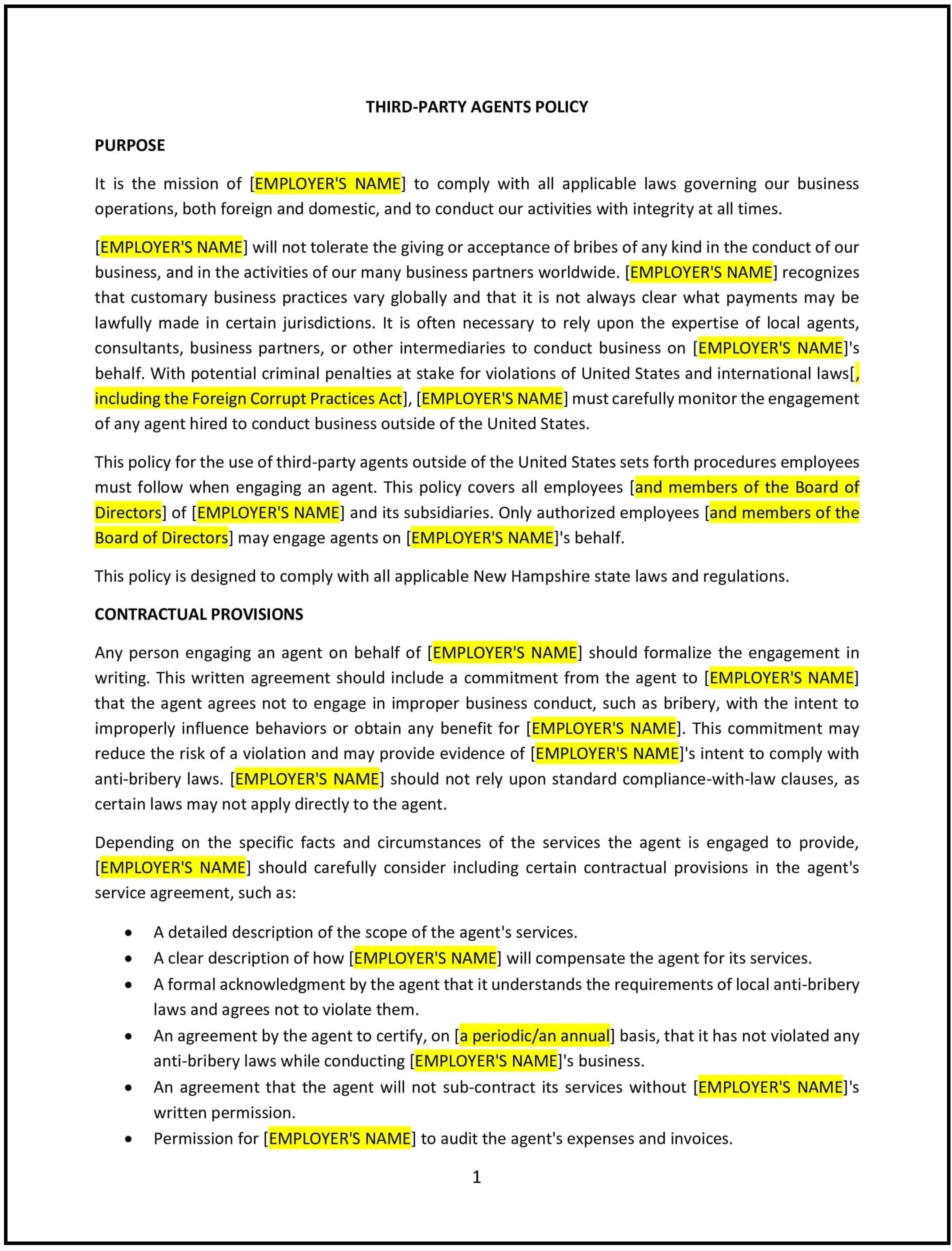Third-party agents policy (New Hampshire): Free template
Got contracts to review? While you're here for policies, let Cobrief make contract review effortless—start your free review now.

Customize this template for free
Third-party agents policy (New Hampshire)
A third-party agents policy helps New Hampshire businesses establish clear guidelines for engaging with third-party agents, contractors, and service providers. This policy defines the expectations for third-party relationships, including the selection process, performance monitoring, and compliance with company standards. It also addresses how to manage risks and ensure that third-party actions align with the company’s objectives and values.
By implementing this policy, businesses can protect themselves from potential legal, financial, and reputational risks associated with third-party relationships while ensuring that all third parties adhere to the same ethical and operational standards as internal employees.
How to use this third-party agents policy (New Hampshire)
- Define third-party agents: Specify who qualifies as a third-party agent under the policy, including contractors, vendors, consultants, and other external partners.
- Set selection criteria: Outline the criteria businesses should use when selecting third-party agents, including factors like experience, qualifications, financial stability, and alignment with company values.
- Establish expectations for conduct: Set clear expectations for the behavior and performance of third-party agents, including adherence to the company’s ethical standards, compliance with applicable laws, and the delivery of quality services or products.
- Address confidentiality and data protection: Define how third-party agents must handle confidential company information and ensure compliance with data protection regulations, such as the General Data Protection Regulation (GDPR) or the Health Insurance Portability and Accountability Act (HIPAA).
- Monitor and manage third-party performance: Establish procedures for monitoring third-party agents' performance and ensuring they meet the agreed-upon service levels, deadlines, and quality standards.
- Set terms for termination: Include provisions for terminating contracts with third-party agents who fail to meet performance expectations, breach confidentiality, or violate the terms of the agreement.
- Document agreements: Specify that all third-party relationships should be documented in written contracts that outline the terms of the agreement, deliverables, timelines, and compensation.
- Review and update: Regularly review and update the policy to ensure it reflects changes in business needs, legal requirements, and best practices for managing third-party relationships.
Benefits of using this third-party agents policy (New Hampshire)
This policy provides several benefits for New Hampshire businesses:
- Reduces risks: By establishing clear guidelines for third-party relationships, businesses can mitigate risks related to performance, confidentiality, compliance, and reputation.
- Promotes consistency: The policy helps ensure that all third-party agents follow consistent standards and meet the company’s expectations for quality and ethical conduct.
- Enhances accountability: Clear monitoring and reporting processes hold third-party agents accountable for their actions and performance, ensuring that the business receives the services or products it is paying for.
- Protects confidential information: The policy helps safeguard sensitive company information by outlining specific expectations for confidentiality and data protection.
- Improves decision-making: By setting clear selection criteria, businesses can make more informed decisions when engaging third-party agents, ensuring that they choose reliable, trustworthy partners.
Tips for using this third-party agents policy (New Hampshire)
- Communicate the policy clearly: Ensure that employees who engage third-party agents understand the policy and how to apply it when selecting or managing these relationships.
- Conduct due diligence: Before entering into agreements with third-party agents, businesses should thoroughly vet them to assess their qualifications, financial stability, and reputation.
- Monitor performance: Regularly review the performance of third-party agents to ensure they are meeting the terms of the agreement and take corrective action if necessary.
- Maintain clear contracts: Ensure that all third-party relationships are governed by written contracts that clearly define expectations, deliverables, timelines, compensation, and termination procedures.
- Provide training: Provide employees who manage third-party relationships with the training and tools they need to effectively evaluate and oversee third-party agents.